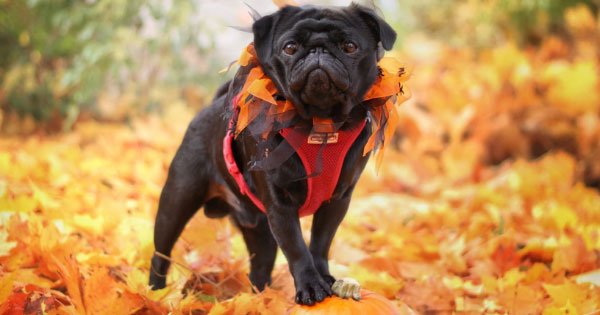
Too many calories consumed and too little exercise often lead to unwanted weight gain. This is a problem that often comes with the holiday season. As humans stay inside to avoid cold and rain, often so do our furry family members. As we gather to enjoy the holiday feast in the company of our loved ones, we tend to share the bounty of our table with our pets. The sneaky table scraps and treats often result in some extra love handles and a tip on the scale.
So what’s a pet parent to do? How can we enjoy the holidays with four-legged family members in a more healthy way? With a little planning, you can have fun and keep your pet at its ideal body weight.
Why Weight Management is Crucial for Pets
All pets have an ideal weight for their breed and size. As few as five pounds above your pet’s ideal weight can put them at an increased risk of certain diseases, reduced quality of life, and a shortened lifespan. Studies approximate that 58% of cats and 53% of dogs are overweight or obese. Unfortunately, when your pet crosses the overweight or obese line, it’s no longer a question of “if” they’ll develop health problems and complications but “how many and how soon.” Here are some of the common health issues associated with excess weight in pets:
- High blood pressure
- Osteoarthritis
- Kidney disease
- Respiratory and heart disease
- Insulin resistance and Type 2 Diabetes
- Chronic inflammation
- Cranial cruciate ligament injury
- Heat intolerance
- Many forms of cancer
- Urinary tract disease
- Decreased life expectancy and premature death
Pets with weight problems are often less energetic and playful. Their bone structure carries more weight than it can handle. Because of this, it’s easy to overlook health problems since we attribute their behavior to their “normal laziness.”
Is Your Pet Overweight?
First and foremost, it’s important to have an honest conversation with your vet about your furry friend’s weight. Your vet can assess your pet’s health and weight and make recommendations based on their findings. They can also teach you to assess your pet’s weight by feeling certain parts of their body and observing their body shape. If your pet has excess weight, you may notice the following signs:
- Loss of an obvious waist
- Ribs are hard or impossible to feel when running your hand along your pet’s side
- Collar needs loosening
- Slow movement or difficulty walking
- Bad temper
- Shortness of breath
- Sleeping more than usual
Body score charts for cats and dogs can also help you estimate your pet’s score. It helps determine if they’re overweight, underweight, or ideal body weight.
Ways to Keep Your Pet at a Healthy Weight This Holiday Season
There’s no magic remedy or a one-size-fits-all approach to helping your pet shed excess pounds. Maintaining a healthy weight requires discipline, patience, and commitment to a healthier lifestyle based on caloric intake and activity level. In simplest terms, you need to achieve a balance between the calories consumed and calories used by the body. Even a modest weight loss can significantly reduce your pet’s risk of serious diseases.
Keep table scraps and treats to a minimum. Instead focus on healthier treats and balanced, nutritious pet food. Use a food puzzle, special bowl, or toy that dispenses food in small amounts or makes it harder for your pet to gulp their food. This can help slow down food consumption. The hardest thing is to give in to your pet’s sad, begging eyes, but it’s important for their health. Consult with your vet about the best food choices for your pet, including treats.
A brisk, 30-minute walk, obstacle course, game of fetch, or hide and seek can help keep your dog active when you can’t do long walks. For your cat, get a cat toy or flashlight to encourage active play. A food treasure hunt or an obstacle such as tall furniture can get your cat active and moving around during feeding time.
Weight management is crucial for pets. Don’t let your pet pack on the holiday pounds. Call Naples Coastal Animal Hospital today at (239) 500-0105 to schedule your pet’s annual checkup. Our experienced vets can work with you to develop a weight loss and/or weight management plan that is right for your canine companion. All in a fear-free, comfortable setting to minimize stress.
